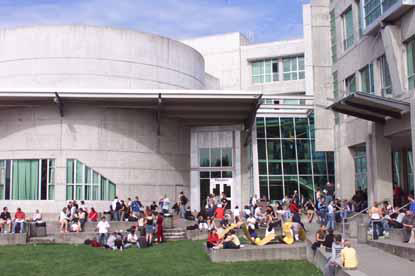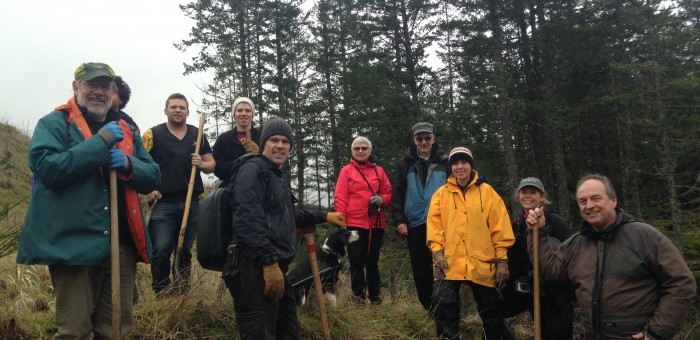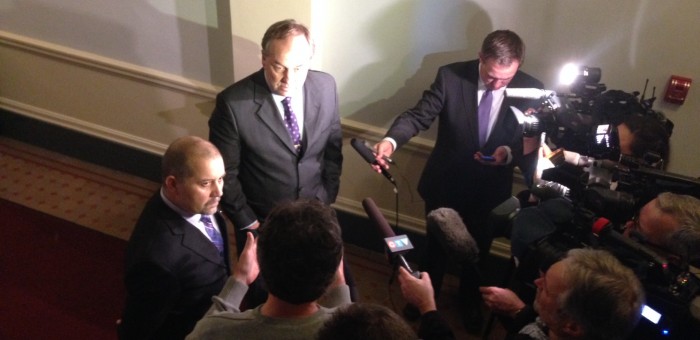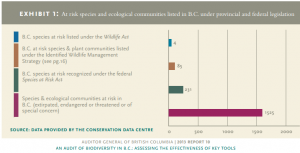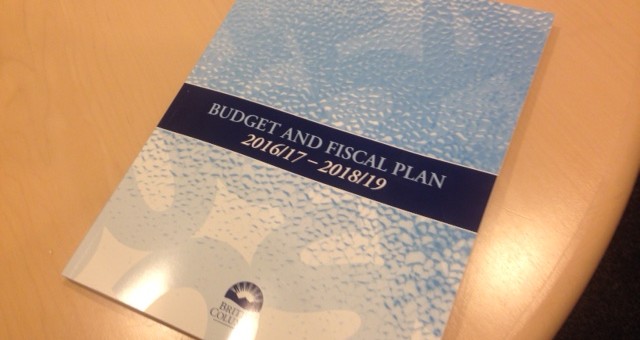Issues & Community Blog - Andrew Weaver: A Climate for Hope - Page 126
Post-Secondary Sexual Violence Policies Act
Media Release: March 8th, 2016
Andrew Weaver Tables Post-Secondary Sexual Violence Policies Act
For Immediate Release
Victoria, B.C. – Today at the B.C. Legislature, Andrew Weaver, MLA for Oak Bay – Gordon Head and Leader of the B.C. Green Party, tabled the Post-Secondary Sexual Violence Policies Act, a bill that aims to address the pervasive occurrence of sexualized violence plaguing universities and colleges in British Columbia.
“It is estimated that one in four female university students will be sexually assaulted during the relatively short amount of time they spend on campus,” said Andrew Weaver. “It is unacceptable that we are not taking clearer steps as a Province to help create a safe environment for our students.”
Sexualized violence is an issue that impacts all genders and all ages. Being young and female, however, are the biggest risk factors for being sexually assaulted.
“The opportunity to succeed and thrive in university shouldn’t hinge on whether or not you are young, female and statistically likely to experience sexual violence,” said Weaver. “A staggering number of bright young women pursuing their academic ambitions are forced to deal with the threat of sexualized violence. It’s time for our government and universities to stand up and say enough is enough.”
Weaver brought forward the Post-Secondary Sexual Violence Policies Act to create a legal responsibility for universities and colleges in British Columbia to develop and maintain policies that would provide education for students, support for victims, and work to prevent the occurrences of sexual violence. The act would allow University specific policies to be developed that would meet the needs of students, including education and protection, while working to create a safe environment for students to come forward to report a sexual assault.
“The reality is that it is women who are most vulnerable at post-secondary institutions to being sexually assaulted or harassed, and that there simply isn’t the capacity for adequate prevention and support,” said Weaver. “While I chose International Women’s Day to table this bill, this is a societal issue and one that affects people of all gender identities. I hope our work will improve the safety of post-secondary experiences for everyone.”
-30-
Media Contact
Mat Wright – Press Secretary Andrew Weaver MLA
1 250 216 3382
mat.wright@leg.bc.ca
Shawnigan Lot 21 Soil Sample Results
Late last week I received the results from the soil samples I collected on Lot 21 during the period that title reverted to the Crown.
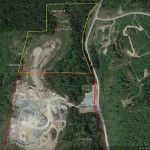 As I discussed earlier, I collected a total of fives samples from five separate locations on Lot 21 (see image above left for precise locations). Since automated drilling instruments were not allowed under FLNRO policy on Crown Land Use Policy, we used shovels to dig the five samples at depths of 28″, 14″, 15″, 22″ and 0″, respectively,
As I discussed earlier, I collected a total of fives samples from five separate locations on Lot 21 (see image above left for precise locations). Since automated drilling instruments were not allowed under FLNRO policy on Crown Land Use Policy, we used shovels to dig the five samples at depths of 28″, 14″, 15″, 22″ and 0″, respectively,
The soil samples were analysed by Maxxam Analytics for Volatile Organic, Total Hydrocarbon and Elemental Metal analyses. The results are now available. While I recognize that my approach of taking a few samples is a bit like looking for a needle in a hay stack, the good news is that both volatile organic and total hydrocarbon content were below detectable levels in all samples.
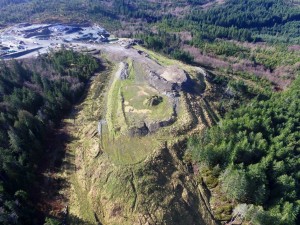 As indicated in the Residential/Parkland column of the Soil Quality Guidelines of the Canadian Council of Ministers of the Environment, the only sample that revealed above-recommended values was Sample #3. In this case both Zinc and Copper were over the guidelines.
As indicated in the Residential/Parkland column of the Soil Quality Guidelines of the Canadian Council of Ministers of the Environment, the only sample that revealed above-recommended values was Sample #3. In this case both Zinc and Copper were over the guidelines.
While my tests are by no means exhaustive and do not address the fundamental question as to what, if anything, is buried deep under the surface in Lot 21, they add to the body of knowledge concerning the area.
Calling for more ambition in Federal approach to climate
Media Statement: March 03, 2016
Andrew Weaver calls for more ambition in Federal approach to climate
For Immediate Release
Victoria, B.C. – Recognizing the positive step forward that has been taken in bringing together the Premiers of Canada to work on a climate plan, Andrew Weaver, Leader of the B.C. Green Party and MLA for Oak Bay-Gordon Head, says the agreement today is more about good political optics, than about substantive climate policy.
“We don’t meet our targets without a price on carbon. Pure and simple,” says Weaver. “While I recognize that federal leadership has been lacking for the last decade, and that coming together to try and unite our country around climate action is a significant improvement, in reality this agreement postpones any nation-wide action for at least six months.”
“At the end of the day we don’t need a plan to create a plan,” says Weaver. “Our Prime Minister promised to work out a national climate strategy within 90 days of Paris and that didn’t happen today. We need action and firm commitments. Investments in green infrastructure is good news, but carbon pricing is what is ultimately needed.”
“Climate action in British Columbia has also been stalled under Premier Clark,” said Andrew Weaver. “No substantive new climate action has been taken, and GHG emissions are once again on the rise. Leader’s lead. They don’t wait for others to catch up.”
-30-
Media Contact
Mat Wright – Press Secretary Andrew Weaver MLA
1 250 216 3382
mat.wright@leg.bc.ca
Toad Road yet no Abode
 Given the myriad challenges facing wildlife in our province, one of the best things we can do to protect biodiversity in B.C. is to leave key habitat areas intact. As the global climate warms and precipitation patterns shift, having a complete ecosystem within which animals and plants can try to adapt will be essential, and frankly the least we can do given the dire situation many species are in.
Given the myriad challenges facing wildlife in our province, one of the best things we can do to protect biodiversity in B.C. is to leave key habitat areas intact. As the global climate warms and precipitation patterns shift, having a complete ecosystem within which animals and plants can try to adapt will be essential, and frankly the least we can do given the dire situation many species are in.
This is not news to the government, of course. For species ranging from mountain caribou to spotted owls and goshawks, the Ministry of Environment is quick to reference habitat loss as a contributing, if not the main, factor in population declines:
“human activities associated with resource extraction are the ultimate threats to caribou in British Columbia. Human development fragments and alters caribou habitat…“
“[The spotted owl] is at risk in this province because much of its habitat has been adversely affected by logging or lost due to land development.“
“The laingi subspecies of Northern Goshawk requires large areas of old-growth and mature forest. Large-scale timber harvesting removes much suitable nesting and foraging habitat… Because of this, the laingi subspecies is believed to be in jeopardy, and is on the British Columbia Red List.“
Likewise, the government cites habitat destruction as one of the greatest impacts on western toad populations in B.C.
“Development in and around wetlands can destroy or isolate populations.“
To a lesser extent, though still of importance, migrating toads are often killed by traffic as they try to cross roads.
Western toads are considered a species of conservation concern by the government of British Columbia and have been designated a status of special concern by the Committee on the Status of Endangered Wildlife in Canada (COSEWIC). In theory, they are protected under the B.C.’s Wildlife Act.
While BC has the most biodiversity in Canada, it is also one of two provinces (the other being Alberta) that has no provincial endangered species legislation. Sadly, BC is the home of more than 1,500 species currently at risk of extirpation or extinction.
 Summit Lake, just outside the village of Nakusp in the Kootenay region, is a key breeding area for western toads. Every year, usually around the end of August, young toadlets migrate from the shoreline of Summit Lake, across Highway 6, to upland habitat where they will live for four or five years before they return to the lake to breed. The mass migration sees upwards of a million little toads attempting the crossing, with tens of thousands getting run-over in the process.
Summit Lake, just outside the village of Nakusp in the Kootenay region, is a key breeding area for western toads. Every year, usually around the end of August, young toadlets migrate from the shoreline of Summit Lake, across Highway 6, to upland habitat where they will live for four or five years before they return to the lake to breed. The mass migration sees upwards of a million little toads attempting the crossing, with tens of thousands getting run-over in the process.
Hoping to help, nearby communities hold an annual Toadfest where people carrying the migrating western toads from the curb to the forest in buckets. The provincial government has also tried to address the problem by building directional fences leading to toad tunnels that allow the toads to safely cross under the highway. This amounts to an innovative solution and $200,000 investment in the protection of an increasingly threatened species. In the Ministry of Transportation and Infrastructure’s employee newsletter about their work they described the mass movement of western toads from Summit Lake to the forest as “among the great wildlife migrations in the world.”
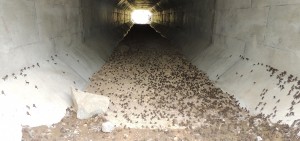 Unfortunately, the story doesn’t end there. After being safely escorted across the highway, via toad tunnel or bucket, the toads will now find themselves in a forest slotted for logging. Road building began last week and there are plans in the works to clear cut the 30 hectares where the toads hibernate.
Unfortunately, the story doesn’t end there. After being safely escorted across the highway, via toad tunnel or bucket, the toads will now find themselves in a forest slotted for logging. Road building began last week and there are plans in the works to clear cut the 30 hectares where the toads hibernate.
To their credit, the Nakusp and Area Community Forest (NACFOR) logging company has drafted a toad management plan and identified small habitat features that they’ll try to leave intact. I commend NACFOR for exploring ways in which they can continue to harvest the timber while also being mindful of this species of special concern, but it is really the government that should be in the leadership role here.
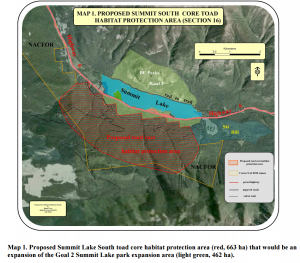 Protection of core terrestrial habitat – defined as “the spatial delineation of 95% of the population that encompasses terrestrial foraging, breeding, and overwintering habitats rather than buffers” – is seriously recommended in the scientific literature for amphibians (Semlitsch and Bodie 2003, Browne and Paszkowski 2010, Crawford and Semlitsch 2007). If the existing provincial park at Summit Lake were expanded to include the forest within roughly two kilometers of the lake the protection of core terrestrial habitat would likely be achieved, wildlife biologist Wayne McCrory said in his analysis of the situation.
Protection of core terrestrial habitat – defined as “the spatial delineation of 95% of the population that encompasses terrestrial foraging, breeding, and overwintering habitats rather than buffers” – is seriously recommended in the scientific literature for amphibians (Semlitsch and Bodie 2003, Browne and Paszkowski 2010, Crawford and Semlitsch 2007). If the existing provincial park at Summit Lake were expanded to include the forest within roughly two kilometers of the lake the protection of core terrestrial habitat would likely be achieved, wildlife biologist Wayne McCrory said in his analysis of the situation.
The province has been criticized for failing to set aside adequate habitat to protect caribou, spotted owls and goshawks and this toad situation illustrates just how reluctant the B.C. government is to remove forest from the logging land base. The key western toad forest habitat around Summit Lake is a relatively small, very specific area that could be included into the existing provincial park. This would represent a minor exemption from their 9,816 hectare total operating base.
 The creation of the toad tunnel represented an admirable step forward for the government’s approach to wildlife issues. Granting approval to log their core terrestrial habitat represents more of a smoking bulldozer ride back – squashing all their advancements in the process.
The creation of the toad tunnel represented an admirable step forward for the government’s approach to wildlife issues. Granting approval to log their core terrestrial habitat represents more of a smoking bulldozer ride back – squashing all their advancements in the process.
“Be an advocate for amphibians – protect toads and their habitat in your neighbourhood,” reads the government’s BC Frog Watch website.
Good advice, that I respectfully urge the BC government to follow by protecting western toad habitat around Summit Lake before it’s too late.
Bill 10 — Budget Measures Implementation Act, 2016
Today in the legislature I rose to speak at second reading on Bill 10, Budget Measures Implementation Act 2016. The budget implementation bill is an omnibus bill that proposes to bring into law the various measures outlined in the government’s budget.
In any budget there are always aspects that one can support and other aspects that one cannot support. You’ll see from my speech below that this budget implementation bill is no different.
For example, the budget implementation bill extends the BC Seniors’ Home Renovation Tax Credit to individuals with a disability. This is a welcome change. Extending the Tourism Accommodation Assessment Relief Act applicability to rural areas, something that was supported through a motion from the Union of BC Municipalities, is also an important step forward.
But unfortunately, the government has missed the boat on addressing the affordability crisis in Vancouver. And the Prosperity Fund is nothing more that a political stunt. Below I reproduce the text of my speech; I also link to its video.
You’ll see from the text that the Minister of Advanced Education was heckling me throughout my speech. Honestly, it was rather off putting and I would have expected better. It got so bad that when Leonard Krog, MLA for Naniamo, was speaking after me, I stood on a point of order as I could not even hear what he was saying.
Text of my Speech
A. Weaver: I was busy booking a flight to Vancouver, expecting a Liberal member opposite to stand up and defend their budget, offer insight as to why this budget implementation act is a good one. Instead, all they resort to is chirping little bits here and little bits there.
I rise to speak to Bill 10, Budget Measures Implementation Act, 2016. As you know, this bill essentially lays out the implementation across a diversity of bills — amendments here, amendments there — to implement government priorities as outlined in the budget speech.
There are a number of aspects to this. Number one, of course, is the introduction of the prosperity fund, the so-called $100 billion prosperity fund, a fund that was promised to British Columbians in the last election during a Hail Mary pass of hope that was given by this government to British Columbians in a desperate attempt to try to get elected — 100,000 jobs, $100 billion prosperity fund, debt-free B.C., elimination of PST, thriving schools and thriving hospitals, and on and on. A pot of gold at the end of the LNG rainbow was promised to each and every British Columbian.
In a desperate attempt to try to fulfil this outlandish promise — this promise that anybody in the natural gas industry knew was absurd, this promise that only the Liberals themselves convinced themselves had any dream of reality — when it finally….
Interjection.
A. Weaver: I hear sighing coming across the benches over there. The reality is, if you go back and look at the presentation given by the Deputy Minister of Energy and Mines to the clean energy conference in 2012, you would see, in that presentation, natural gas prices projected to increase into the $20 to $30 range in the months and years ahead.
There is not a single person internationally who would ever have thought natural gas prices were going to increase like that, in light of the fact that everybody has discovered horizontal fracking technology, that Russia is so close to China and has reserves almost 20 times those of natural gas, that Iran, which has the largest reserve in the world, would have its….
Interjection.
A. Weaver: The Minister of Advanced Education is truly quite pompous over there. What is so remarkable, is that I know his own colleagues think he’s a pompous person as well. So it would be quite…. It’s very difficult to actually continue with this.
Interjection.
Deputy Speaker: Order, please.
A. Weaver: Thank you, hon. Speaker. I’m glad to have some order back in here.
The prosperity fund is, as I pointed out, a desperate attempt to try to look like government is responding to its promise in the provincial election. When you actually look at this $100 million prosperity fund, it really is only $25 million, because 50 percent of that is going to be used to pay down debt. That’s $50 million. Another $25 million is going to be used for government priorities. What are those government priorities? Let me lay them out for you.
We’re going to see, over the course of the next year, a bunch of little tidbits — election tidbits — offered to British Columbians in the same vein as was offered in the last election, promises of this and promises of that. Say whatever it takes to get through lunch. Then say whatever it takes to get to dinner, and say whatever it takes again to get through to the next day.
There is also the Property Transfer Act that’s being modified in the budget implementation act. Government’s response to an affordability crisis in Vancouver, rather than standing back and recognizing that there are three reasons for this affordability crisis, or their speculative housing market: (1) lack of enforcement of the Real Estate Services Act; (2) a preponderance of vacant homes and owners of those vacant homes not being required to pay the true cost, the social cost, of leaving vacant properties…. That is — now, I know the Minister of Advanced Education has a hard time when I start to use economic language — the externalities associated with vacant homes have not been internalized to the people with those vacant homes. Those externalities are a social cost. And the third reason is the existence of loopholes that allow people to avoid paying property transfer tax or register on title where they live.
It was with the latter that I do appreciate the government introducing two aspects of policy. One is with respect to bare trustees now being required to say who they are. The second one, of course, is that on title, you will now have to declare if you are a Canadian citizen or not. The problem with this is that should have been extended to also require you to list if your primary residence is in another province, as other provinces do in British Columbia.
Interjection.
A. Weaver: Sorry — as other provinces do in Canada.
My goodness, I could only imagine having to live in a house with the Minister of Advanced Education. While I am straight, I would have divorced this man within a matter of moments, as he is simply intolerable. His hubris, his pomposity, his arrogance is so intolerable, it makes one want to be ill. But with that, I will move on.
Even the minister’s opposite are laughing, because they all agree with me as well, I know.
The property transfer tax. The government’s response, rather than dealing with the issue, is to incentivize further speculation. How do I say that? Well, one piece of policy that’s introduced is an elimination of property transfer taxes on new homes under $750,000. At first glance, one might think that’s a good thing.
But what is this incentivizing? What it’s incentivizing , but what it’s incentivizing is the purchase of older homes, the ripping down of those older homes and constructing of townhouse developments. Creating more supply may sound like a good thing, but unfortunately, it’s not addressing the critical issue, which is internalizing the social costs of leaving homes vacant.
It simply incentivizes our speculative economy, an economy that this government thinks is actually diversified and stable but, I would argue, is very, very flimsy, because it is being buttressed by an artificial, speculative housing market in greater Vancouver and now coming to the CRD. That is not a healthy situation. We only have to go to Scottsdale or Phoenix, Arizona, to see what happens to an economy that is built on a speculative housing market. It keeps going, and then there’s the big crash. And this government, like it has done with LNG, will blame global market foes that we have no control over. But they do have control. There are things that could be done now.
This government should be putting a price on leaving vacant properties empty. Putting a price on those vacant properties does two things. One, it incentivizes renting of those properties. It makes people want to rent those properties, which puts downward pressure on rental prices. Two, it actually reduces, then, the demand on new homes, because there are more people in rental homes.
Internalizing the externalities — making vacant homes have to pay the social cost. This can be done in a revenue-neutral fashion. The money raised through the tax of vacant homes could be used, for example, to help house the homeless. It could be used, for example, to give rental subsidies. It does not have to be a money grab for government.
Government has a responsibility to use the tools it has to ensure that the market is fair. The housing market in Vancouver is not a free market. It is a market failure. It’s a failure because the social cost is not being paid, and the only way to do that is actually put a price on leaving your homes vacant.
Bare trust is another one that I’ve mentioned over the last couple of years as a loophole that was originally put in place a long time ago — back in the 80s, I believe, even before the so-called dreaded 90s.
Hon. A. Wilkinson: That must have been around the 16th century
A. Weaver: Maybe it was around the 16th century, but I don’t believe anything the Minister of Advanced Education says, because he’s so pompous. Everything he says, you’re supposed to believe. And I believe none of it. He loses credibility when he continues to chirp that way.
The problem with registering properties in bare trusts and then flipping beneficial ownership of a bare trust means that you don’t change title. There is no change of title in the land title office, and that means there is no property transfer tax paid. Government has proposed to study this. But we know what result we’re going find out. We’re going to find that there’re a lot of houses out there that are flipping not on titled but through beneficial ownership.
Now, Ontario understands this. Ontario understands this. They are the other jurisdiction in Canada that has a property transfer tax. But where they apply the property transfer tax is on beneficial ownership change, not on title change. They don’t apply it on title change. They apply it on beneficial ownership change.
If I am foreign company and I’d like to buy a property and speculate it in Vancouver, here’s what I might do. I might purchase the property and put it in a bare trust. Then I might start flipping this bare trust, the ownership or the corporation that owns this bare trust, and sell it. It can be….
Interjection.
A. Weaver: Hon. Speaker, may I ask you to please address the Minister of Advanced Education and ask him that I have a right to speak in the Legislature without having to listen to his pomposity? Frankly, enough is enough.
Deputy Speaker: Order, Minister.
Interjection.
A. Weaver: Thank you, hon. Speaker.
I agree with the Minister of Health. They have to listen to him, but I don’t have to listen to him.
Coming back to the bare trust, coming back to the example I was giving, a company can put an individual…. I know there’re a whole bunch of entities can own the bare trust, and they can sell it. They can flip it a multitude of times. They can start to flip it amongst shell companies themselves. But never at any time are we changing title, and no property transfer tax has changed.
And this government has no idea who owns it, because they’re not tracking…. At least they will, coming up. But they were not tracking the bare trustees and those who have beneficial ownership. But rather than spending time tracking it, they should be actually disincentivizing by applying the property transfer tax on transfer of beneficial ownership.
Now, with that said, there are, of course, aspects of this budget implementation act that I do support. I mean, continuing the flow-through mining share credit, the flow-through share agreement, for another year seems reasonable. It has been working quite well to incentivize investment in the mining sector in British Columbia.
The Tourist Accommodation (Assessment Relief) Act changes are responding to a UBCM resolution to extend the assessment relief to rural regions.
The B.C. seniors home-renovation tax credit — extending that to individuals with a disability. It’s hard to find anything wrong with that proposal.
And the food donation tax credit — it’s an interesting idea, but I worry. I have spoken to people at Mustard Seed and elsewhere, food bank agencies. There’s a worry here — that has to be, actually, carefully regulated and examined — that this could be misused for dumping of product that has no value and is being used as a loophole to get a tax credit.
For example, let’s suppose I’m a company that has, in reserve, 10,000 barrels of molasses, and I can’t sell it. But now I give it to a food bank at fair market value. The market value is essentially zero because I can’t sell it, but there will be some nominal fee attached to it. This food bank is then ending up with 10,000 barrels of molasses that it has no use for.
What matters with this food donation tax credit is that the devil is in the details — that is, implementation is not being used as a means and a way of avoiding dealing with product that no one wants. How many litres of molasses do we need? And there are other examples that can occur like this.
I understand that it makes sense that, perhaps, the local farmer here in North Saanich has a few extra crates of, say, apples and, you know, he’d like to donate those to the local food bank and get a small tax credit. That seems reasonable. Why not just deal with the problem, however, in the first place?
Why are we actually having to deal with giving away food to food banks? What is wrong with our economy? What is wrong with our social programs? What is wrong with our society when we even have to introduce this tax credit in the first place? That’s the real question.
The question is not the food donation tax credit, which everybody can get behind in some way. The real question is: why is it that we, as our society here in British Columbia, one of the wealthiest places in the world — not just in North America but in the world — has to introduce a food donation tax credit? What next? A used clothes donation tax credit? Shoe donation tax credit? Used sportswear donation tax credit? It’s a slippery slope, and it’s not addressing, again, the fundamental inequities in our province that this budget should be addressing.
What’s not in this bill? A number of things are not in this bill, and I will look forward, in committee stage, to discussing some aspects of this.
I’ve had a number of people contact me, concerned about the increase in property transfer tax for homes valued over $2 million. That may seem like it’s a tax on the wealthy. It may seem at first glance, but let’s suppose you’re living in Vancouver. You grew up in Vancouver, and you’re a family of four.
Mom and Dad get pretty old, and Mom and Dad are so old that they need to leave their house. But Mom and Dad want to give their children their house. There’s concern that in doing so, those children, who could barely be affording to live in Vancouver anyway, would be subject to the increased property transfer tax and then move into a home that they couldn’t afford to buy, but it was a family home.
The problem, of course, here is that $2 million may seem like a lot, but it’s not a lot in Vancouver. So care has to be put in place to ensure that during the transfer of title between family members, this doesn’t occur.
Now, I get that if the house was put in a trust and it was transferred within family members, nobody would pay tax. But most of us don’t buy our houses in trusts. Most of us buy them as individuals, and we leave them to others or we try to give them to our children. There’s a little element there that government needs to some care over.
What is also not in this, in the budget implementation act and the budget in general…. There’s absolutely nothing to do with climate leadership. Now, I say that with some irony. I recognize that the Minister of Health has a Chevy Volt. It’s not a pure electric car, but it is pretty good. He lives in Kamloops — I get it — and he wants to drive to Victoria. I applaud him for a Chevy Volt.
Interjections.
A. Weaver: You have to. Yeah.
The electric car subsidy — that qualifies — is a good thing. I have a Nissan LEAF —100 percent electric. It’s a good thing.
Interjections.
A. Weaver: The Minister of Advanced Education goes off on a tangent again, because he wants to hear his own voice.
Do I pay road tax? Yes, I pay road tax. When I go over the Port Mann Bridge in Vancouver, I pay road tax.
Interjections.
Deputy Speaker: Members, order.
A. Weaver: Apart from the electric vehicle, there is nothing, zero, about climate leadership. Why is that important? Because right now, today, in Vancouver, first ministers are meeting with the Prime Minister to discuss climate leadership.
What do we have here in this House on that day? An introduction of another bill — another bill to give away our resource to the LNG industry, as we are continually desperate to try to find ways and means that they don’t have to account for their greenhouse gases. Or we can change the international rules to pretend that some greenhouse gases are not really greenhouse gases.
That is what this government thinks is climate leadership. The irony is that it’s on the day that we’re supposed to be talking about this in Vancouver.
What’s also not in here, in this budget, is anything of substance in terms of MSP reform. This tinkering around the edges in the budget, not so much in the implementation act….
Where, for example, are steps being taken to fulfil government’s promise that each and every British Columbian would have a GP by the end of 2015? Each and every British Columbian would have access — this is a promise — to a general practitioner by 2015.
Well, I hope you aren’t looking for a GP in this area, because there is not a single GP south of Duncan that is accepting new patients.
While the government is quite desperate to fulfil its promise of wealth and prosperity through an industry that’s not going happen and basically gives away our resource in a desperate attempt to get an agreement, they’re not willing to deal with another promise — the “GP for everyone” promise.
I could go on and on, and I know the Minister of Advanced Education would love me to. But with that, I’ll conclude with one final statement.
When you look at this Budget Measures Implementation Act and you look at the individual boutique exemptions here or the little addition there, what you get is a sense of what this government is doing.
This government has lost its sense of vision. It has lost its sense of vision of what a prosperous British Columbia looks like. They’re fixated on a speculative housing market. They’re fixated on LNG.
They don’t understand what a diversified economy is. It’s not an economy that’s propped up with an artificial, speculative, Scottsdale-style housing market until we can maybe get LNG ten years from now or twenty years from now. That’s not a diversified economy.
They don’t understand what’s going on with the elements of our society that are struggling to make ends meet.
This budget, through its implementation, is something that cannot be supported for what’s not in it, not so much for the boutique tax credits that are in it but for what’s not in it: assistance to those who can barely make ends meet, structural changes to things like the MSP, dealing with the affordability crisis in means and ways that actually ensure that it’s dealt with, instead of incentivizing the problem still further, and dealing with an issue that was simply not addressed in the budget — education.
Who are we as a society if we don’t value the next generation, the generation in our schools and colleges today, as the important asset of our future? LNG is not important in the big picture. Our next generation is important. They are the citizens of tomorrow. They are the ones who will build the economy of tomorrow.
They are the ones who will take care of us when we’re older. They are the ones who will discover the cures for various diseases that you and I will get as we get older.
But there is nothing, nothing at all in this, for education, whether that be K to 12, whether that be early childhood education or whether that be post-secondary education. That is the single biggest disaster of this budget: it does not do anything for the next generation. That is why I cannot support it.

